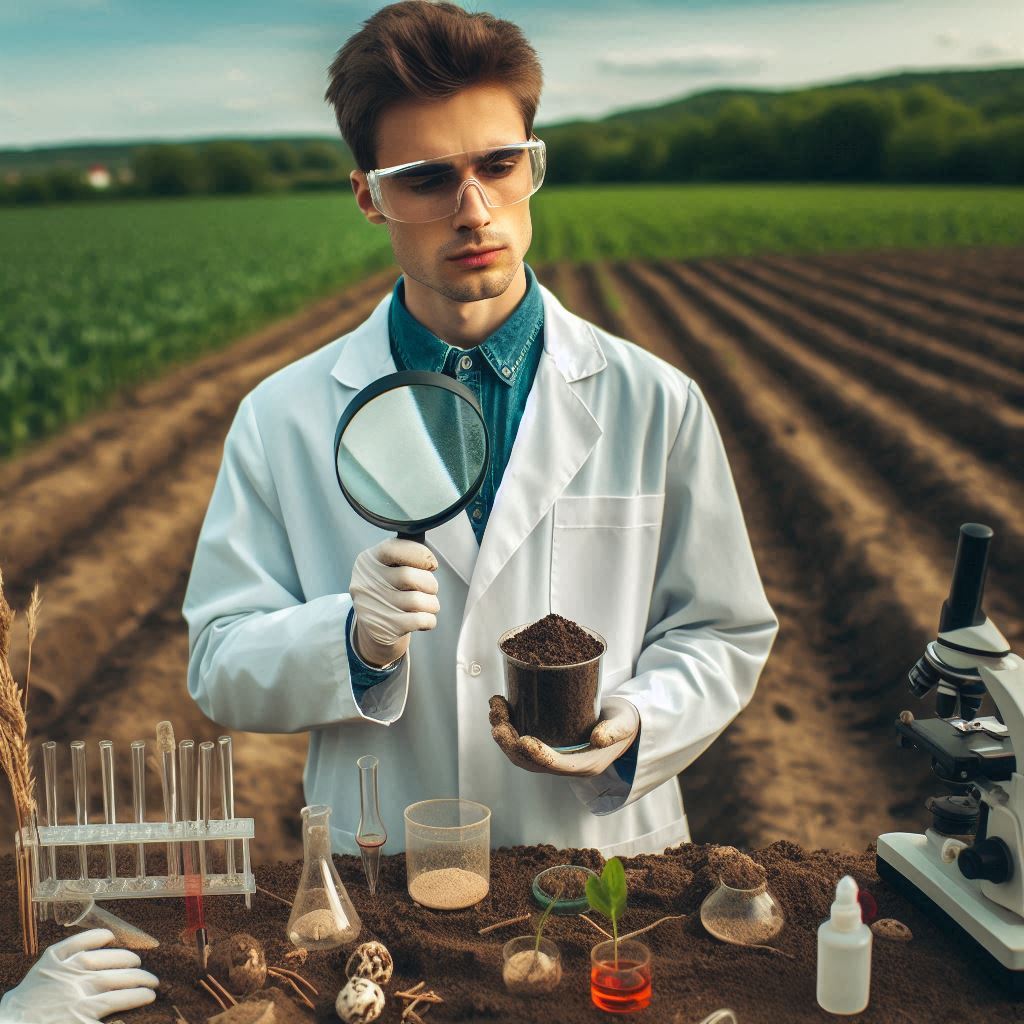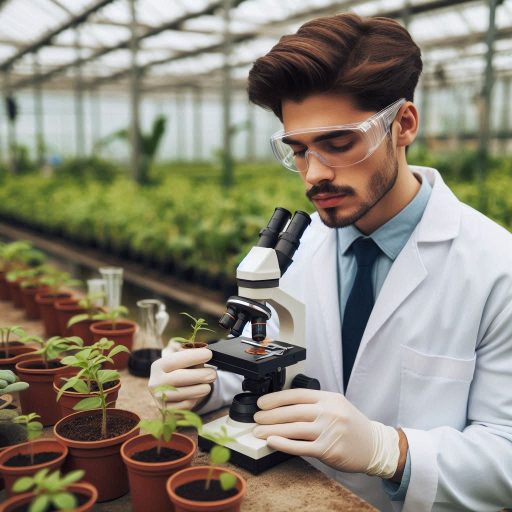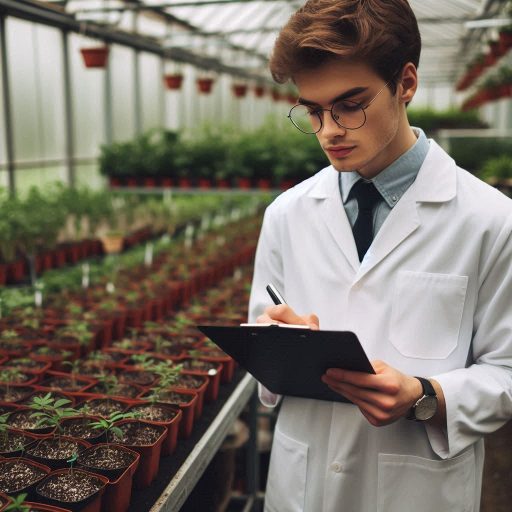Introduction
Soil science laboratories play a vital role in advancing our understanding of soil health and management.
These facilities conduct research on soil composition, fertility, and environmental impact.
They utilize advanced technology and methodologies to analyze soil samples and provide essential data.
In the USA, prominent soil science laboratories contribute significantly to agricultural productivity and environmental sustainability.
Research conducted in these labs informs best practices for soil management, crop production, and land use.
Understanding soil properties helps farmers make informed decisions, leading to increased yields and reduced environmental impact.
Additionally, soil science research addresses pressing issues such as soil erosion, contamination, and climate change.
By studying these challenges, laboratories develop solutions that promote soil conservation and restoration.
Their findings guide policymakers and land managers in implementing effective strategies.
Moreover, collaborations between universities, government agencies, and private organizations enhance soil science research.
These partnerships facilitate knowledge exchange and drive innovation in soil management practices.
Soil science laboratories are essential for conducting research that impacts agriculture and the environment.
Their work contributes to sustainable land use and improved soil health across the USA.
Investing in soil science research ultimately supports food security and ecological resilience for future generations.
United States Department of Agriculture’s Agricultural Research Service (USDA-ARS)
History and Mission of the Laboratory
The USDA Agricultural Research Service’s (ARS) Soil and Water Management Research Unit in Florida exemplifies a leading soil science laboratory.
Established in 1934, it aims to improve soil health and enhance agricultural productivity.
The mission of the laboratory focuses on developing sustainable practices for soil and water management.
Researchers at this laboratory work collaboratively with farmers and agricultural communities.
They strive to create solutions that enhance soil quality and conserve natural resources.
The laboratory’s work addresses critical issues such as soil erosion, nutrient management, and water quality.
The laboratory has evolved over the years, adapting to new scientific advancements and societal needs.
It now embraces cutting-edge technologies, including remote sensing and precision agriculture.
These innovations help researchers monitor soil health and assess environmental impacts more effectively.
Research Focus Areas and Projects
The Soil and Water Management Research Unit focuses on several key areas of soil science research.
One major area is soil erosion and sedimentation control.
Researchers study the effects of various land management practices on soil stability and erosion rates.
Another important focus is soil fertility and nutrient management.
The laboratory conducts experiments to determine optimal nutrient application rates for different crops.
This research aims to enhance crop yields while minimizing environmental impacts.
The laboratory also investigates the impact of climate change on soil health.
Researchers analyze how changing weather patterns affect soil properties and agricultural productivity.
They develop strategies to help farmers adapt to these changes and maintain soil health.
In addition, the laboratory collaborates on projects related to soil remediation.
This includes studying methods for restoring contaminated soils and improving their health.
These projects contribute to environmental sustainability and public health.
Notable Findings and Contributions to Soil Science
The Soil and Water Management Research Unit has made significant contributions to soil science over the years.
One notable finding is the development of best management practices (BMPs) for soil conservation.
These practices help reduce soil erosion and improve water quality in agricultural landscapes.
The laboratory has also contributed to the understanding of soil organic matter dynamics.
Researchers have identified key processes that affect the accumulation and decomposition of organic matter in soils.
This knowledge is essential for improving soil fertility and carbon sequestration.
Additionally, the laboratory has developed innovative techniques for assessing soil health.
These techniques allow for rapid and accurate evaluations of soil properties.
As a result, farmers can make informed decisions about soil management and conservation practices.
Furthermore, the laboratory’s research on precision agriculture has advanced the field significantly.
By integrating technology into soil management, farmers can optimize inputs and enhance productivity while reducing environmental impacts.
Prominent soil science laboratories like the USDA ARS Soil and Water Management Research Unit play a crucial role in advancing soil science.
Their history and mission reflect a commitment to sustainable practices and environmental stewardship.
Through focused research areas and innovative projects, these laboratories contribute valuable findings that benefit agriculture and the environment.
Their work enhances our understanding of soil health, informs policy decisions, and promotes sustainable land use practices.
By supporting soil science research, we pave the way for a healthier planet and a more sustainable future.
Read: How Climate Change Is Impacting Plant Research
Cornell University Soil Health Laboratory
Background and Affiliation with Cornell University
The Soil and Crop Sciences Section operates within Cornell University, a prestigious Ivy League institution.
Located in Ithaca, New York, Cornell has a long history of excellence in agricultural research.
The laboratory focuses on understanding soil systems and crop interactions, promoting sustainable practices.
Researchers in this section are affiliated with the College of Agriculture and Life Sciences.
This affiliation fosters interdisciplinary collaboration among scientists, engineers, and agricultural professionals.
The diverse expertise enhances the laboratory’s ability to address complex soil-related challenges.
Additionally, the laboratory engages with local farmers and stakeholders.
This collaboration ensures that research aligns with practical needs and addresses real-world problems.
By connecting academia with the agricultural community, the laboratory maximizes its impact on sustainable agriculture.
Research Areas and Methodologies Used
The Soil and Crop Sciences Section conducts research across various areas.
Soil fertility and nutrient management are primary focuses.
Researchers analyze soil composition to optimize crop production and minimize environmental impact.
Another critical area is soil health and conservation.
Scientists study soil structure, organic matter content, and microbial activity.
This research helps develop practices that enhance soil resilience and productivity.
The laboratory also investigates sustainable land management strategies.
Researchers evaluate crop rotation, cover cropping, and reduced tillage.
These methodologies promote soil health while improving overall farm productivity.
To achieve their research goals, scientists employ diverse methodologies.
They conduct field experiments, laboratory analyses, and modeling studies.
Advanced technologies, such as remote sensing and geographic information systems (GIS), enhance data collection and analysis.
Impact on Sustainable Agriculture Practices in the USA
The work of the Soil and Crop Sciences Section significantly impacts sustainable agriculture practices across the USA.
Research findings inform farmers about best management practices that enhance soil health.
This guidance leads to improved crop yields and reduced reliance on chemical inputs.
Furthermore, the laboratory’s studies contribute to the development of environmentally friendly farming techniques.
By promoting practices like cover cropping and reduced tillage, the laboratory helps combat soil erosion and nutrient loss.
These techniques not only improve soil quality but also enhance biodiversity.
The section also plays a vital role in educating future soil scientists and agricultural professionals.
Through academic programs and outreach initiatives, they prepare students to address pressing agricultural challenges.
This education fosters a new generation of scientists committed to sustainable practices.
Moreover, the laboratory collaborates with government agencies and organizations.
These partnerships ensure that research findings inform policies and programs that promote sustainable agriculture.
The laboratory’s influence extends beyond academia, shaping agricultural practices nationwide.
The Soil and Crop Sciences Section at Cornell University exemplifies the vital role of soil science laboratories in sustainable agriculture.
Through diverse research areas and innovative methodologies, the laboratory enhances soil health and informs best management practices.
Its impact on sustainable agriculture practices in the USA contributes to food security and environmental preservation, making it a prominent player in the field of soil science.
Read: Exploring the Different Branches of Geology
University of California, Davis Soil Science Laboratory
Overview of the Laboratory’s History and Significance
The Soil Science Society of America (SSSA) recognizes many prominent laboratories in the country.
One such laboratory is the USDA’s Agricultural Research Service (ARS) in Beltsville, Maryland.
Established in 1901, this laboratory has a long history of advancing soil science research.
The ARS laboratory conducts research that informs national agricultural policies.
It plays a crucial role in addressing soil health and sustainability issues.
The lab’s findings have significantly impacted land management practices and agricultural productivity.
Another notable facility is the National Soil Survey Center (NSSC) in Lincoln, Nebraska.
Founded in 1899, the NSSC focuses on soil classification and mapping.
Its extensive soil database supports land use planning and environmental assessments.
Research Activities in Soil Chemistry and Biology
Research activities at these laboratories cover various aspects of soil science.
The ARS laboratory in Beltsville conducts research on soil chemistry, microbiology, and nutrient cycling.
Researchers study soil interactions with water, nutrients, and contaminants to improve soil health.
In addition, the laboratory investigates the impacts of agricultural practices on soil ecosystems.
They analyze how different farming techniques influence soil quality and sustainability.
Their research provides valuable data for developing best management practices.
At the NSSC, researchers focus on soil classification and characterization.
They conduct detailed soil surveys to identify different soil types across the United States.
Understanding these classifications helps inform land-use decisions and resource management strategies.
Additionally, the lab studies soil biology, examining microbial communities and their roles in nutrient cycling.
This research helps scientists understand how soil organisms contribute to ecosystem functions.
Insights from this research inform sustainable agricultural practices and environmental conservation efforts.
Collaborations with Industry and Government Agencies
Prominent soil science laboratories collaborate with various industry and government agencies.
The ARS laboratory partners with universities, agricultural extension services, and private sector organizations.
These collaborations enhance research efforts and ensure practical applications of scientific findings.
The lab also works closely with the Environmental Protection Agency (EPA) to assess soil contamination and remediation strategies.
This partnership helps develop effective policies for soil conservation and management.
Similarly, the NSSC collaborates with agricultural stakeholders to provide soil survey data.
These collaborations help farmers, landowners, and policymakers make informed decisions about land use and resource allocation.
By sharing data and insights, these laboratories promote sustainable practices across different sectors.
Moreover, both laboratories contribute to international soil science initiatives.
They engage in research projects that address global soil challenges, such as land degradation and food security.
These collaborations highlight the importance of soil science in a broader context.
Prominent soil science laboratories in the USA play a vital role in advancing the field.
Their historical significance, research activities, and collaborations contribute to soil health and sustainability.
As they continue to investigate soil chemistry and biology, these laboratories will impact agricultural practices and environmental conservation efforts.
The work they do is crucial for understanding and managing our planet’s vital soil resources.
Read: Top Skills Needed for a Successful Geology Career

University of Illinois Soil Testing Laboratory
Purpose and Services Offered by the Laboratory
Prominent soil science laboratories focus on analyzing soil samples for various purposes.
They conduct tests to determine soil composition, pH, and nutrient levels.
This information is crucial for farmers, researchers, and environmentalists.
These laboratories offer services such as soil fertility testing and contaminant analysis.
They help identify nutrient deficiencies and recommend appropriate amendments.
By understanding soil health, stakeholders can optimize crop yields and improve land management practices.
Additionally, laboratories provide data on soil erosion and compaction.
This information helps assess land sustainability and conservation efforts.
Understanding these factors is essential for maintaining healthy ecosystems and productive farmland.
Moreover, many laboratories specialize in specific areas of research.
Some focus on soil microbiology, while others study soil-water interactions.
These specialized studies contribute to advancements in soil science and environmental protection.
Importance of Soil Testing for Agriculture and Environmental Management
Soil testing is crucial for effective agricultural practices.
It helps farmers make informed decisions about fertilization and soil amendments.
By knowing the nutrient content, farmers can apply the right amounts of fertilizers, reducing waste and environmental impact.
Testing also plays a significant role in sustainable agriculture.
It helps identify soil health issues that may affect crop production.
By addressing these problems, farmers can enhance soil fertility and promote long-term productivity.
Furthermore, soil testing is essential for environmental management.
It helps identify contaminated sites and assess soil quality.
Understanding soil contamination is critical for developing remediation strategies and protecting human health.
Soil testing also aids in compliance with environmental regulations.
Government agencies often require soil assessments to ensure safe land use.
Laboratories provide the necessary data to meet these regulatory standards.
Outreach Programs and Educational Initiatives
Prominent soil science laboratories engage in outreach programs to educate the public.
They offer workshops and training sessions for farmers and land managers.
These initiatives aim to promote best practices in soil management and conservation.
Many laboratories collaborate with universities and agricultural extension services.
They provide resources and expertise to support local communities.
This collaboration enhances awareness of soil health and its importance for agriculture and the environment.
In addition, laboratories often participate in school programs.
They teach students about soil science and its role in ecosystems.
Engaging young minds fosters interest in science and encourages future careers in soil science.
Moreover, some laboratories create online resources and publications.
These materials provide valuable information about soil health, testing methods, and management practices.
By disseminating knowledge, laboratories empower stakeholders to make informed decisions.
In essence, prominent soil science laboratories in the USA play a crucial role in advancing soil research and management.
They provide essential testing services that support agriculture and environmental management.
The importance of soil testing cannot be overstated, as it informs sustainable practices and protects ecosystems.
Through outreach programs and educational initiatives, these laboratories foster awareness and promote best practices in soil health.
By engaging with communities, they contribute to a better understanding of the critical role soil plays in our world.
Read: The Future of Botany: Emerging Fields and Innovations
Kansas State University Soil Testing Lab
Description of Laboratory Facilities and Resources
Prominent soil science laboratories feature state-of-the-art facilities and cutting-edge equipment.
These laboratories house advanced instruments for soil analysis, such as spectrometers and chromatographs.
These tools allow scientists to conduct precise assessments of soil properties.
Many laboratories include specialized sections for different soil analyses.
For example, they may have dedicated areas for physical, chemical, and biological assessments.
This organization enables efficient and accurate testing of various soil samples.
Additionally, laboratories often feature greenhouses for controlled experiments.
These greenhouses allow researchers to observe plant responses to different soil conditions.
Conducting experiments in a controlled environment helps refine nutrient management strategies.
Laboratories also maintain extensive soil databases.
These databases compile historical soil data, enabling scientists to track changes over time.
This information is invaluable for understanding soil health and fertility trends.
Moreover, collaboration with other research institutions enhances laboratory capabilities.
Sharing resources and expertise allows for more comprehensive studies.
This collaborative approach strengthens soil science research and its applications in agriculture.
Research Focus on Soil Fertility and Nutrient Management
A significant focus of these laboratories is soil fertility and nutrient management.
Researchers aim to develop practices that optimize soil health and enhance crop yields.
Their work contributes to sustainable agriculture and food security.
Laboratories conduct experiments to determine the best nutrient application methods.
This includes testing different fertilizers and organic amendments.
Understanding the effects of these inputs on soil and crop health is crucial for effective management.
Researchers also investigate soil amendments that improve nutrient retention.
These studies help identify practices that reduce nutrient leaching and enhance availability to plants.
By optimizing nutrient management, laboratories support more efficient agricultural practices.
Additionally, soil science laboratories explore the impact of soil microbiomes on fertility.
Understanding the role of beneficial microorganisms can lead to improved soil health strategies.
Research in this area focuses on enhancing microbial diversity and activity.
The findings from these research efforts are disseminated to farmers and agricultural professionals.
Laboratories often publish results in scientific journals and offer workshops for practical application.
This knowledge transfer helps implement effective soil management practices.
Partnerships with Local Farmers and Extension Services
Prominent soil science laboratories actively engage with local farmers and extension services.
These partnerships facilitate the exchange of knowledge and resources.
Collaborating with farmers allows researchers to address real-world agricultural challenges.
Laboratories often conduct field trials in partnership with local growers.
These trials test new practices and technologies under actual farming conditions.
This hands-on approach helps validate research findings and refine recommendations.
Extension services play a crucial role in disseminating research to farmers.
They help translate scientific findings into practical guidelines for soil management.
These services ensure that farmers have access to the latest information and best practices.
Furthermore, workshops and training sessions organized by laboratories foster community engagement.
These events promote collaboration and strengthen the relationship between researchers and farmers.
By working together, they can develop solutions that enhance soil health and productivity.
In summary, partnerships between soil science laboratories and local farmers create a feedback loop.
Researchers gain insights from practical experiences, while farmers benefit from cutting-edge research.
This collaborative approach enhances the effectiveness of soil management practices.
Prominent soil science laboratories in the USA are crucial for advancing agricultural practices.
Their state-of-the-art facilities support research focused on soil fertility and nutrient management.
Through partnerships with local farmers and extension services, these laboratories bridge the gap between research and practice.
By working together, they enhance soil health, promote sustainable agriculture, and ensure food security for future generations.
Transform Your Career Today
Unlock a personalized career strategy that drives real results. Get tailored advice and a roadmap designed just for you.
Start NowNorth Carolina State University Soil Science Laboratory
Role of the Laboratory in Soil Research and Education
Soil science laboratories conduct critical research that enhances our understanding of soil systems.
They investigate soil properties, processes, and interactions with plants and the environment.
Researchers study topics like soil fertility, erosion, and pollution to address agricultural and environmental challenges.
These laboratories also play a crucial role in education.
They provide resources and training for students pursuing degrees in soil science.
Educational programs often include hands-on experiences, allowing students to apply theoretical knowledge in real-world settings.
Additionally, these laboratories contribute to public awareness about soil issues.
They host workshops, seminars, and community outreach programs.
By educating the public, they promote a greater appreciation for soil’s role in sustaining ecosystems.
Impact on Soil Conservation and Environmental Sustainability
The impact of soil science laboratories on soil conservation is profound.
Their research informs best practices for soil management, promoting sustainable agriculture.
By identifying soil degradation factors, they help develop strategies to restore and protect soils.
Furthermore, laboratories often collaborate with governmental and non-governmental organizations.
These partnerships enhance conservation efforts by integrating scientific research with policy initiatives.
Through these collaborations, they address pressing environmental issues like soil erosion, salinization, and contamination.
The work done in these laboratories contributes to environmental sustainability.
Healthy soils play a critical role in carbon sequestration and water filtration.
By advancing our understanding of soil functions, laboratories support efforts to combat climate change.
Training Programs for Students and Professionals in Soil Science
Prominent soil science laboratories offer various training programs for students and professionals.
These programs enhance skills in soil analysis, research methodologies, and data interpretation.
Participants gain valuable insights into current trends and technologies in soil science.
Internships and fellowships are common offerings at these laboratories.
These opportunities provide hands-on experience in research and fieldwork.
Participants often work alongside experienced scientists, gaining mentorship and guidance.
Workshops and short courses are also available to professionals seeking further education.
These programs focus on specific topics, such as soil health assessment or sustainable land management practices.
Continuing education helps professionals stay updated on the latest advancements in the field.
Additionally, laboratories often engage in community outreach.
They provide training for farmers and landowners on best management practices.
By sharing knowledge, they empower local communities to implement sustainable soil management.
Prominent soil science laboratories in the USA play an essential role in research, education, and conservation.
Their work advances our understanding of soil systems and informs sustainable practices.
By offering training programs, these laboratories contribute to developing the next generation of soil scientists.
Their impact on soil conservation and environmental sustainability is vital for a healthier planet.
Texas A&M AgriLife Extension Soil, Water, and Forage Testing Laboratory
Services Provided by the Laboratory to Farmers and Ranchers
Prominent soil science laboratories offer a variety of services to farmers and ranchers.
They conduct soil testing to analyze nutrient levels, pH, and organic matter content.
This analysis helps farmers understand their soil’s needs and tailor their management practices.
Laboratories also provide consultation services, helping farmers interpret soil test results.
Experts explain the implications of the findings and suggest appropriate amendments.
This guidance enables farmers to optimize their soil health and crop productivity.
In addition, many laboratories offer educational resources.
They conduct workshops and seminars on soil management and sustainable practices.
These resources empower farmers with knowledge, enhancing their ability to make informed decisions.
Soil laboratories often partner with local agricultural extension offices.
These partnerships facilitate outreach and provide farmers access to testing services.
Collaboration ensures that farmers receive timely support and guidance tailored to their specific needs.
Research on Soil Health and Water Quality in Texas
In Texas, several prominent soil science laboratories focus on research related to soil health and water quality.
These laboratories study the effects of land management practices on soil ecosystems.
They investigate how practices impact nutrient cycling, soil structure, and microbial communities.
Research initiatives often examine the relationship between soil health and water quality.
Laboratories analyze runoff and drainage patterns to assess how agricultural practices affect local water bodies.
This research helps identify best practices that minimize environmental impacts.
Furthermore, Texas laboratories collaborate with universities and governmental agencies.
These partnerships enhance research efforts and promote knowledge sharing.
Together, they work towards developing innovative solutions for soil and water management.
The laboratories also conduct long-term studies on soil health indicators.
They monitor changes in soil quality over time, evaluating the effectiveness of various practices.
This data is invaluable for making evidence-based recommendations to farmers.
Soil Management Practices Based on Laboratory Findings
Based on laboratory findings, scientists provide tailored recommendations for soil management practices.
These recommendations help farmers enhance soil health and increase agricultural productivity.
For instance, soil test results may indicate nutrient deficiencies.
Laboratories recommend specific fertilizers or amendments to address these deficiencies.
This targeted approach ensures that farmers apply the right nutrients at the right time.
Soil management recommendations often include crop rotation strategies.
Rotating crops can improve soil structure and nutrient balance.
This practice reduces pest pressure and enhances overall soil health.
Additionally, laboratories advise on cover cropping to prevent erosion and improve soil organic matter.
Cover crops contribute to soil health by enhancing microbial activity and nutrient cycling.
Farmers also receive guidance on conservation practices.
Implementing no-till or reduced-till systems can significantly improve soil structure and moisture retention.
These practices promote sustainability while maximizing crop yields.
Prominent soil science laboratories in the USA provide essential services to farmers and ranchers.
They conduct soil testing, offer consultations, and deliver educational resources.
In Texas, research on soil health and water quality informs best practices for sustainable agriculture.
Based on laboratory findings, tailored recommendations enhance soil management practices.
By leveraging the expertise of these laboratories, farmers can improve soil health, increase productivity, and contribute to environmental sustainability.
Conclusion
Soil science laboratories in the USA play a critical role in advancing our understanding of soil health and management.
These facilities conduct essential research on soil properties, nutrients, and ecosystem dynamics.
They provide valuable data that informs agricultural practices, environmental conservation, and land-use planning.
Prominent laboratories, such as the USDA’s Soil Conservation Service and university-based research centers, lead groundbreaking studies.
Their work helps address global challenges, including food security and climate change.
Collaboration between these laboratories fosters innovation and drives advancements in soil science.
Supporting and promoting soil research efforts is vital for sustainable development.
Increased funding and resources can enhance laboratory capabilities and expand research initiatives.
Public awareness and community involvement can also drive interest in soil science and its importance.
Future prospects in soil science are promising.
Advancements in technology, such as remote sensing and soil genomics, will enhance research methods.
These innovations can lead to more effective soil management practices and improved agricultural sustainability.
Encouraging partnerships between researchers, policymakers, and industry stakeholders will amplify the impact of soil science.
Everyone can contribute by advocating for soil research and education in their communities.
[E-Books for Sale]
The Big Book of 500 High-Paying Jobs in America: Unlock Your Earning Potential
$19.99 • 500 High-Paying Jobs • 330 pages
Explore 500 high-paying jobs in America and learn how to boost your career, earn more, and achieve success!
See All 500 High-Paying Jobs of this E-Book
1001 Professions Without a Degree: High-Paying American Jobs You Can Start Now
$19.99 • 1001 Professions Without a Degree • 174 pages
Discover 1001 high-paying jobs without a degree! Unlock career tips, skills, and success strategies for just $19.99!




